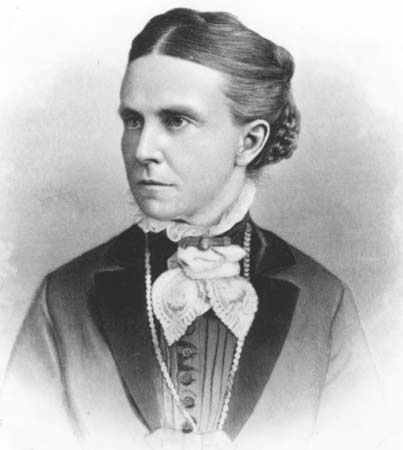Brown, Olympia
American activist and minister
born Jan. 5, 1835, Prairie Ronde, Mich., U.S.
died Oct. 23, 1926, Baltimore, Md.
 minister and social reformer, an active campaigner for woman suffrage and one of the first American women whose ordination was sanctioned by a full denomination.
minister and social reformer, an active campaigner for woman suffrage and one of the first American women whose ordination was sanctioned by a full denomination.Brown was refused admission to the University of Michigan because of her sex and instead attended Mount Holyoke College in South Hadley, Massachusetts, for a year and then Antioch College (now Antioch University) in Yellow Springs, Ohio, graduating in 1860. Three years later, under the inspiration of Antoinette Blackwell (Blackwell, Antoinette Brown), she graduated from the theological school of St. Lawrence University in Canton, New York, and in June 1863 was ordained in the ministry of the Universalist church, becoming the first American woman to be ordained by full denominational authority. (Blackwell's ordination in a Congregational church rested on the autonomous authority of a single congregation.) Brown served churches in Weymouth, Massachusetts (1864–70), and Bridgeport, Connecticut (1870–76).
Brown's long latent interest in women's rights was aroused by a meeting with Susan B. Anthony (Anthony, Susan B.) in 1866, and she became one of the cause's leading champions in the West. She campaigned vigorously but unsuccessfully for universal suffrage in Kansas in 1867. When Brown married in 1873, she retained her maiden name. In 1887 she resigned a pastorate she had accepted nine years earlier in order to devote herself to suffrage work. The same year, she attempted to vote in a municipal election in Racine, Wisconsin, was refused, and instituted a lengthy and ultimately unsuccessful suit to challenge the law.
From that point on she continued her suffrage activities, wrote Acquaintances, Old and New, Among Reformers (1911), and managed her husband's newspaper (the Racine Times) and printing business from his death in 1893 until 1900. In 1914 Brown moved to Baltimore, where she remained, active and independent, until her death.
- Timothy Dwight
- Timothy Findley
- Timothy Geithner
- Timothy Leary
- Timothy McVeigh
- Timothy Mo
- Timothy O'Sullivan
- Timothy Palmer
- Timothy Pickering
- Timothy, Saint
- Timothy, The Letter of Paul to
- timpani
- Timpanogos Cave National Monument
- Timrod, Henry
- Tim Russert
- Timucua
- Timur
- Timurid Dynasty
- Timur ruby
- tin
- Tina Fey
- Tina Modotti
- tinamou
- Tina Turner
- Tinbergen, Jan